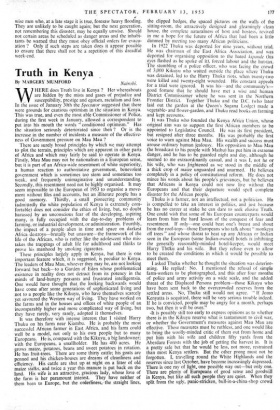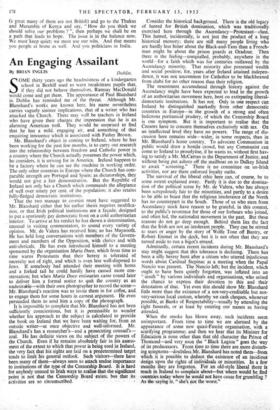Truth in Kenya
By MARGERY MUMFORD Nairobi.
WHERE does Truth live in Kenya ? Her whereabouts are hidden by the mists and gases of prejudice and susceptibility, prestige and egoism, racialism and fear. In the issue of January 30th the Spectator suggested that there were grounds for cautious optimism in the situation in Kenya. This was true, and even the most able Commissioner of Police, during the first week in January, allowed a correspondent to put into his mouth the words " conditioned optimism." Has the situation seriously deteriorated since then ? Or is the increase in the number of incidents a measure of the effective- ness of Government pressure on Mau Mau ?
There are surely broad principles by which we may attempt to plot the terrain, principles which are apparent in other parts of Africa and which may fairly be said to operate in Kenya. Firstly, Mau Mau may not be nationalism in a European sense, but it is part of an Africa-wide resentment of white superiority, a human reaction to authoritative government, benevolent government which is sometimes too stern and sometimes too weak, and frequently unimaginative and ununderstanding. Secondly, this resentment need not be highly organised. It may seem impossible to the European of 1953 to organise a move- ment without files and accounts, but an illiterate people has a good memory. Thirdly, a small pioneering community (admittedly the white population of Kenya is extremely com- fortable) does not consider the ethics of living, but, no doubt harassed by an unconscious fear of the developing, aspiring many, is fully occupied with the day-to-day problems of farming, or industrial development, or administration. Fourthly, the impact of a people alien in time and space on darkest Africa destroys—brutally but unaware—the framework of the life of the African, who is rather like the adolescent who mis- takes the trappings of adult life for adulthood and thinks to prove his manhood by smoking cigarettes. These principles largely apply in Kenya, but there is one important feature which, it is suggested, is peculiar to Kenya. The leaders of Mau Mau, whoever they may be, are not looking forward but back—to a Garden of Eden whose problematical existence in reality does not detract from its potency in the minds of land-hungry peasants and frustrated intelligentsia. One would have thought that the looking backwards would have come after some generations of sophisticated living and not to a people like the Kikuyu, who have themselves scarcely yet savoured the Western way of living. They have worked on the farms and in the houses and offices of white people of an incomparably higher and more complicated way of living, but they have rarely, very rarely, adopted it themselves. It was therefore with intense interest that I visited Harry Thuku on his farm near Kiambu. He is probably the most successful African farmer in East Africa, and his farm could well be a model, not only to his own people but to many Europeans. He is, compared with the Kikuyu, a big landowner; with the Europeans, a smallholder. He has 400 acres. He grows maize, potatoes, beans and sweet potatoes in rotation. He has fruit-trees. There are some 'thirty cattle; his goats are penned and his chicken-houses are dreams of cleanliness and efficiency. His cattle are shut up at night on a litter of old maize stalks; and twice a year this manure is put back on the land. His wife is an attractive, gracious lady, whose love of the farm is her paramount interest. They have neither of them been to Europe, but the orderliness,• the straight lines. the clipped hedges, the spaced pictures on the walls of the sitting-room, the attractively designed and gleamingly clean house, the complete naturalness of host and hostess, revived in me a hope for the future of Africa that had been a little dimmed by meeting too many African politicians. • In 1922 Thuku was deported for nine years, without trial. He was chairman of the East Africa Association, and was deported for organising opposition to the hated kipande (his eyes flashed as he spoke of it), forced labour and the hut-tax. The stumbling of a police officer, who was facing the crowd of 3,000 Kikuyu who waited outside the place where Thuku was detained, led to the Harry Thuku riots, when twenty-two were killed and twenty-eight wounded. His constant appeals for a trial were ignored. It was his—and the community's— good fortune that he should have met a wise and human District Commissioner where he was sent in the Northern Frontier District. Together Thuku and the D.C. (who later laid out the garden at the Queen's Sagana Lodge) made a vegetable- and flower-garden, and Thuku read books on farming and kept accounts.
It was Thuku who founded the Kenya Africa Union, whose original aim was to support the first African members to be appointed to Legislative Council. He was its first president. but resigned after three months. His was probably the first voice to warn against Mau Mau. His wealth and success must arouse ordinary human jealousy. His opposition to Mau Mau (he broadcast to his people with Mathu) has put him in extreme danger, and he has to be guarded night and day, although he seemed to me extraordinarily casual, and it was I, not he or his wife, who was frightened as we stood in the middle of a thick crop of maize unguarded and unarmed. He believes completely in a policy of constitutional reform. He does not mince his words about his people's grievances, but he believes that Africans in Kenya could not now live without the Europeans and that their departure would spell complete disaster for the African people.
Thuku is a farmer, not an intellectual, not a politician. He is compelled to take an interest in politics, and just because he has no career at stake he can dare to seek elusive Truth.
One could wish that some of his European counterparts would learn from him the hard lesson of the conquest of fear and resentment. If only—one could beat one's breast and shout from the roof-tops—those Europeans who talk about " monkeys off trees " and whose threat to beat up any African or Indian seen in the European (some Indian-owned) hotels is inhibiting the generally reasonably-minded hotel-keeper, would meet Harry Thtiku and his wife. But they refuse even to allow to be created the conditions in which it would be possible to meet them.
I asked Thuku whether he thought the situation was deterior- ating. He replied : No. I mentioned the refusal of simple farm-workers to be photographed, and this after four months of police and army activity on a wide scale, and the added threat of the Displaced Persons problem—those Kikuyu who have been sent back to the overcrowded reserves from the settled areas. No, Thuku still would not agree. " If Jomo Kenyatta is acquitted, there will be very serious trouble indeed. If he is convicted, people may be angry for a month, perhaps two, but then it will be over."
-It is possibly still too early to express opinions as to whether there is in the Kikuyu reserve what is tantamount to civil war, or whether the Government's measures against Mau Mau are effective. These measures must be ruthless, and one would like to bring the woolly-minded critic of them out from home and put him with his wife and children fifty yards from the Aberdare Forests with the job of getting the harvest in. It is a pretty safe bet that he would be less, not more, restrained than most Kenya settlers. But the other prong must not be forgotten. I, travelling round the White Highlands and the reserves since last October, have become increasingly depressed. There is one ray of light, one possible way out—but only one. There are plenty -of Europeans of good sense and goodwill in Kenya. but like all such people they are quiet. When they split from the ugly, panic-stricken, bull-in-a-china-shop crowd (a great many of them are not British) and go to the Thukus and Marumbis of Kenya and say, " How do you think we should solve our problems ? ", then perhaps we shall be on a path that leads to hope. The issue is in the balance now. We must 'keep quiet; we must use our wits. And that means you people at home as well. And you politicians in India.



































 Previous page
Previous page